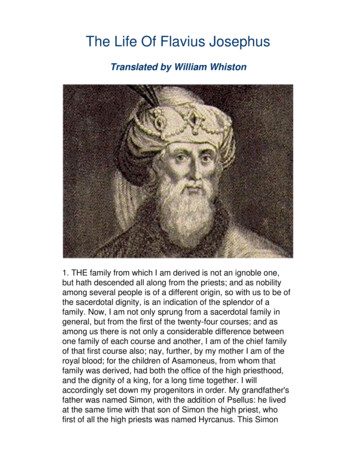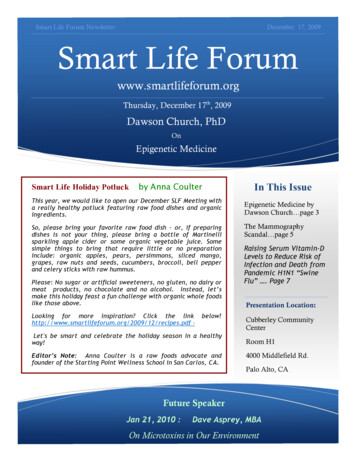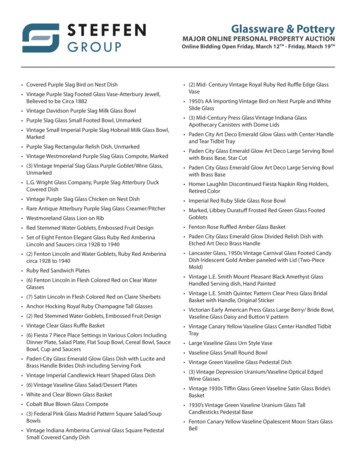
Transcription
The Life Of Flavius JosephusTranslated by William Whiston1. THE family from which I am derived is not an ignoble one,but hath descended all along from the priests; and as nobilityamong several people is of a different origin, so with us to be ofthe sacerdotal dignity, is an indication of the splendor of afamily. Now, I am not only sprung from a sacerdotal family ingeneral, but from the first of the twenty-four courses; and asamong us there is not only a considerable difference betweenone family of each course and another, I am of the chief familyof that first course also; nay, further, by my mother I am of theroyal blood; for the children of Asamoneus, from whom thatfamily was derived, had both the office of the high priesthood,and the dignity of a king, for a long time together. I willaccordingly set down my progenitors in order. My grandfather'sfather was named Simon, with the addition of Psellus: he livedat the same time with that son of Simon the high priest, whofirst of all the high priests was named Hyrcanus. This Simon
Psellus had nine sons, one of whom was Matthias, calledEphlias: he married the daughter of Jonathan the high priest,which Jonathan was the first of the sons of Asamoneus, whowas high priest, and was the brother of Simon the high priestalso. This Matthias had a son called Matthias Curtus, and thatin the first year of the government of Hyrcanus: his son's namewas Joseph, born in the ninth year of the reign of Alexandra:his son Matthias was born in the tenth year of the reign ofArchclaus; as was I born to Matthias in the first year of thereign of Caius Caesar. I have three sons: Hyrcanus, the eldest,was born in the fourth year of the reign of Vespasian, as wasJustus born in the seventh, and Agrippa in the ninth. Thus haveI set down the genealog of my family as I have found itdescribed in the public records, and so bid adieu to those whocalumniate me [as of a lower original].2. Now, my father Matthias was not only eminent on account ofis nobility, but had a higher commendation on account of hisrighteousness, and was in great reputation in Jerusalem, thegreatest city we have. I was myself brought up with my brother,whose name was Matthias, for he was my own brother, by bothfather and mother; and I made mighty proficiency in theimprovements of my learning, and appeared to have both agreat memory and understanding. Moreover, when I was achild, and about fourteen years of age, I was commended by allfor the love I had to learning; on which account the high priestsand principal men of the city came then frequently to metogether, in order to know my opinion about the accurateunderstanding of points of the law. And when I was aboutsixteen years old, I had a mind to make trim of the severalsects that were among us. These sects are three: - The first isthat of the Pharisees, the second that Sadducees, and the thirdthat of the Essens, as we have frequently told you; for I thoughtthat by this means I might choose the best, if I were onceacquainted with them all; so I contented myself with hard fare,and underwent great difficulties, and went through them all. Nordid I content myself with these trials only; but when I wasinformed that one, whose name was Banus, lived in the desert,and used no other clothing than grew upon trees, and had noother food than what grew of its own accord, and bathed
himself in cold water frequently, both by night and by day, inorder to preserve his chastity, I imitated him in those things,and continued with him three years. So when I hadaccomplished my desires, I returned back to the city, being nownineteen years old, and began to conduct myself according tothe rules of the sect of the Pharisees, which is of kin to the sectof the Stoics, as the Greeks call them.3. But when I was in the twenty-sixth year of my age, ithappened that I took a voyage to Rome, and this on theoccasion which I shall now describe. At the time when Felixwas procurator of Judea there were certain priests of myacquaintance, and very excellent persons they were, whom ona small and trifling occasion he had put into bonds, and sent toRome to plead their cause before Caesar. These I wasdesirous to procure deliverance for, and that especiallybecause I was informed that they were not unmindful of pietytowards God, even under their afflictions, but supportedthemselves with figs and nuts. Accordingly I came to Rome,though it were through a great number of hazards by sea; foras our ship was drowned in the Adriatic Sea, we that were in it,being about six hundred in number, swam for our lives all thenight; when, upon the first appearance of the day, and upon oursight of a ship of Cyrene, I and some others, eighty in all, byGod's providence, prevented the rest, and were taken up intothe other ship. And when I had thus escaped, and was come toDieearchia, which the Italians call Puteoli, I became acquaintedwith Aliturius, an actor of plays, and much beloved by Nero, buta Jew by birth; and through his interest became known toPoppea, Caesar's wife, and took care, as soon as possible, toentreat her to procure that the priests might be set at liberty.And when, besides this favor, I had obtained many presentsfrom Poppea, I returned home again.4. And now I perceived innovations were already begun, andthat there were a great many very much elevated in hopes of arevolt from the Romans. I therefore endeavored to put a stop tothese tumultuous persons, and persuaded them to change theirminds; and laid before their eyes against whom it was that theywere going to fight, and told them that they were inferior to the
Romans not only in martial skill, but also in good fortune; anddesired them not rashly, and after the most foolish manner, tobring on the dangers of the most terrible mischiefs upon theircountry, upon their families, and upon themselves. And this Isaid with vehement exhortation, because I foresaw that the endof such a war would be most unfortunate to us. But I could notpersuade them; for the madness of desperate men was quitetoo hard for me.5. I was then afraid, lest, by inculcating these things so often, Ishould incur their hatred and their suspicions, as if I were of ourenemies' party, and should run into the danger of being seizedby them, and slain; since they were already possessed ofAntonia, which was the citadel; so I retired into the inner courtof the temple. Yet did I go out of the temple again, afterManahem and the principal of the band of robbers were put todeath, when I abode among the high priests and the chief ofthe Pharisees. But no small fear seized upon us when we sawthe people in arms, while we ourselves knew not what weshould do, and were not able to restrain the seditious.However, as the danger was directly upon us, we pretendedthat we were of the same opinion with them, but only advisedthem to be quiet for the present, and to let the enemy go away,still hoping that Gessius [Florus] would not be long ere hecame, and that with great forces, and so put an end to theseseditious proceedings.6. But, upon his coming and fighting, he was beaten, and agreat many of those that were with him fell. And this disgracewhich Gessius [with Cestius] received, became the calamity ofour whole nation; for those that were fond of the war were sofar elevated with this success, that they had hopes of finallyconquering the Romans. Of which war another occasion wasministered; which was this: - Those that dwelt in theneighboring cities of Syria seized upon such Jews as dweltamong them, with their wives and children, and slew them,when they had not the least occasion of complaint againstthem; for they did neither attempt any innovation or revolt fromthe Romans, nor had they given any marks of hatred ortreacherous designs towards the Syrians. But what was done
by the inhabitants of Scythopolis was the most impious andmost highly criminal of all; for when the Jews their enemiescame upon them from without, they forced the Jews that wereamong them to bear arms against their own countrymen, whichit is unlawful for us to do; and when, by their assistance, theyhad joined battle with those who attacked them, and hadbeaten them, after that victory they forgot the assurances theyhad given these their fellow citizens and confederates, andslew them all, being in number many ten thousands [13,000].The like miseries were undergone by those Jews that were theinhabitants of Damascus. But we have given a more accurateaccount of these things in the books of the Jewish war. I onlymention them now, because I would demonstrate to myreaders, that the Jews' war with the Romans was not voluntary,but that, for the main, they were forced by necessity to enterinto it.7. So when Gessius had been beaten, as we have saidalready, the principal men of Jerusalem, seeing that therobbers and innovators had arms in great plenty, and fearinglest they, while they were unprovided of arms, should be insubjection to their enemies, which also came to be the caseafterward; and, being informed that all Galilee had not yetrevolted from the Romans, but that some part of it was stillquiet; they sent me and two others of the priests, who weremen of excellent characters, Joazar and Judas, in order topersuade the ill men there to lay down their arms, and to teachthem this lesson, - That it were better to have those armsreserved for the most courageous men that the nation had[than to be kept there]; for that it had been resolved, That thoseour best men should always have their arms ready againstfuturity; but still so, that they should wait to see what theRomans would do.8. When I had therefore received these instructions, I came intoGalilee, and found the people of Sepphoris in no small agonyabout their country, by reason that the Galileans had resolvedto plunder it, on account of the friendship they had with theRomans, and because they had given their right hand, andmade a league with Cestius Gallus, the president of Syria. But I
delivered them all out of the fear they were in, and persuadedthe multitude to deal kindly with them, and permitted them tosend to those that were their own hostages with Gessius toDora, which is a city of Phoenicia, as often as they pleased;though I still found the inhabitants of Tiberias ready to takearms, and that on the occasion following: 9. There were three factions in this city. The first wascomposed of men of worth and gravity; of these Julius Capelluswas the head. Now he, as well as all his companions, Herodthe son of Miarus, and Herod the son of Gamalus, andCompsus the son of Compsus; (for as to Compsus's brotherCrispus, who had once been governor of the city under thegreat king [Agrippa] he was beyond Jordan in his ownpossessions;) all these persons before named gave theiradvice, that the city should then continue in their allegiance tothe Romans and to the king. But Pistus, who was guided by hisson Justus, did not acquiesce in that resolution; otherwise hewas himself naturally of a good and virtuous character. But thesecond faction was composed of the most ignoble persons,and was determined for war. But as for Justus, the son ofPistus, who was the head of the third faction, although hepretended to be doubtful about going to war, yet was he reallydesirous of innovation, as supposing that he should gain powerto himself by the change of affairs. He therefore came into themidst of them, and endeavored to inform the multitude that "thecity Tiberius had ever been a city of Galilee, and that in thedays of Herod the tetrarch, who had built it, it had obtained theprincipal place, and that he had ordered that the city Sepphorisshould be subordinate to the city Tiberias; that they had not lostthis preeminence even under Agrippa the father, but hadretained it until Felix was procurator of Judea. But he told them,that now they had been so unfortunate as to be made a presentby Nero to Agrippa, junior; and that, upon Sepphoris'ssubmission of itself to the Romans, that was become thecapital city of Galilee, and that the royal library and the archiveswere now removed from them." When he had spoken thesethings, and a great many more, against king Agrippa, in orderto provoke the people to a revolt, he added that "this was thetime for them to take arms, and join with the Galileans as their
confederates (whom they might command, and who would nowwillingly assist them, out of the hatred they bare to the peopleof Sepphoris; because they preserved their fidelity to theRomans), and to gather a great number of forces, in order topunish them." And as he said this, he exhorted the multitude,[to go to war;] for his abilities lay in making harangues to thepeople, and in being too hard in his speeches for such asopposed him, though they advised what was more to theiradvantage, and this by his craftiness and his fallacies, for hewas not unskilful in the learning of the Greeks; and independence on that skill it was, that he undertook to write ahistory of these affairs, as aiming, by this way of haranguing, todisguise the truth. But as to this man, and how ill were hischaracter and conduct of life, and how he and his brother were,in great measure, the authors of our destruction, I shall give thereader an account in the progress of my narration. So whenJustus had, by his persuasions, prevailed with the citizens ofTiberias to take arms, nay, and had forced a great many so todo against their wills, he went out, and set the villages thatbelonged to Gadara and Hippos on fire; which villages weresituated on the borders of Tiberias, and of the region ofScythopolis.10. And this was the state Tiberias was now in. But as forGischala, its affairs were thus: - When John, the son of Levi,saw some of the citizens much elevated upon their revolt fromthe Romans, he labored to restrain them, and entreated themthat they would keep their allegiance to them. But he could notgain his purpose, although he did his endeavors to the utmost;for the neighboring people of Gadara, Gabara, and Sogana,wth the Tyrians, got together a great army, and fell uponGischala, and took Gischala by force, and set it on fire; andwhen they had entirely demolished it, they returned home.Upon which John was so enraged, that he armed all his men,and joined battle with the people forementioned; and rebuiltGischala after a manner better than before, and fortified it withwalls for its future security.11. But Gamala persevered in its allegiance to the Romans, forthe reason following: - Philip, the son of Jacimus, who was their
governor under king Agrippa, had been unexpectedlypreserved when the royal palace at Jerusalem had beenbesieged; but, as he fled away, had fallen into another danger,and that was, of being killed by Manahem, and the robbers thatwere with him; but certain Babylonians, who were of hiskindred, and were then in Jerusalem, hindered the robbersfrom executing their design. So Philip staid there four days, andfled away on the fifth, having disguised himself with fictitioushair, that he might not be discovered; and when he was cometo one of the villages to him belonging, but one that wassituated at the borders of the citadel of Gamala, he sent tosome of those that were under him, and commanded them tocome to him. But God himself hindered that his intention, andthis for his own advantage also; for had it not so happened, hehad certainly perished. For a fever having seized upon himimmediately, he wrote to Agrippa and Bernice, and gave themto one of his freed-men to carry them to Varus, who at this timewas procurator of the kingdom, which the king and his sisterhad intrusted him withal, while they were gone to Berytus withan intention of meeting Gessius. When Varus had receivedthese letters of Philip, and had learned that he was preserved,he was very uneasy at it, as supposing that he should appearuseless to the king and his sister, now Philip was come. Hetherefore produced the carrier of the letters before themultitude, and accused him of forging the same; and said thathe spake falsely when he related that Philip was at Jerusalem,fighting among the Jews against the Romans. So he slew him.And when this freed-man of Philip did not return again, Philipwas doubtful what should be the occasion of his stay, and senta second messenger with letters, that he might, upon hisreturn, inform him what had befallen the other that had beensent before, and why he tarried so long. Varus accused thismessenger also, when he came, of telling a falsehood, andslew him. For he was puffed up by the Syrians that were atCaesarea, and had great expectations; for they said thatAgrippa would be slain by the Romans for the crimes which theJews had committed, and that he should himself take thegovernment, as derived from their kings; for Varus was, by theconfession of all, of the royal family, as being a descendant ofSohemus, who had enjoyed a tetrarchy about Libanus; for
which reason it was that he was puffed up, and kept the lettersto himself. He contrived, also, that the king should not meetwith those writings, by guarding all the passes, lest any oneshould escape, and inform the king what had been done. Hemoreover slew many of the Jews, in order to gratify the Syriansof Cesarea. He had a mind also to join with the Trachonites inBatanea, and to take up arms and make an assault upon theBabylonian Jews that were at Ecbatana; for that was the namethey went by. He therefore called to him twelve of the Jews ofCesarea, of the best character, and ordered them to go toEcbatana, and inform their countrymen who dwelt there, ThatVarus hath heard that "you intend to march against the king;but, not believing that report, he hath sent us to persuade youto lay down your arms, and that this compliance will be a signthat he did well not to give credit to those that raised the reportconcerning you." He also enjoined them to send seventy oftheir principal men to make a defense for them as to theaccusation laid against them. So when the twelve messengerscame to their countrymen at Ecbatana, and found that they hadno designs of innovation at all, they persuaded them to sendthe seventy men also; who, not at all suspecting what wouldcome, sent them accordingly. So these seventy went down toCaesarea, together with the twelve ambassadors; where Varusmet them with the king's forces, and slew them all, togetherwith the [twelve] ambassadors, and made an expedition againstthe Jews of Ecbatana. But one there was of the seventy whoescaped, and made haste to inform the Jews of their coming;upon which they took their arms, with their wives and children,and retired to the citadel at Gamala, leaving their own villagesfull of all sorts of good things, and having many ten thousandsof cattle therein. When Philip was informed of these things, healso came to the citadel of Gamala; and when he was come,the multitude cried aloud, and desired him to resume thegovernment, and to make an expedition against Varus, and theSyrians of Cesarea; for it was reported that they had slain theking. But Philip restrained their zeal, and put them in mind ofthe benefits the king had bestowed upon them; and told themhow powerful the Romans were, and said it was not for theiradvantage to make war with them; and at length he prevailedwith them. But now, when the king was acquainted with Varus's
design, which was to cut off the Jews of Caesarea, being manyten thousands, with their wives and children, and all in one day,he called to him Equiculus Modius, and sent him to be Varus'ssuccessor, as we have elsewhere related. But still Philip keptpossession of the citadel of Gamala, and of the countryadjoining to it, which thereby continued in their allegiance to theRomans.12. Now, as soon as I was come into Galilee, and had learnedthis state of things by the information of such as told me ofthem, I wrote to the sanhedrim at Jerusalem about them, andrequired their direction what I should do. Their direction was,that I should continue there, and that, if my fellow legates werewilling, I should join with them in the care of Galilee. But thosemy fellow legates, having gotten great riches from those titheswhich as priests were their dues, and were given to them,determined to return to their own country. Yet when I desiredthem to stay so long, that we might first settle the public affairs,they complied with me. So I removed, together with them, fromthe city of Sepphoris, and came to a certain village calledBethmaus, four furlongs distant from Tiberius; and thence Isent messengers to the senate of Tiberius, and desired that theprincipal men of the city would come to me: and when theywere come, Justus himself being also with them, I told themthat I was sent to them by the people of Jerusalem as a legate,together with these other priests, in order to persuade them todemolish that house which Herod the tetrarch had built there,and which had the figures of living creatures in it, although ourlaws have forbidden us to make any such figures; and I desiredthat they would give us leave so to do immediately. But for agood while Capellus and the principal men belonging to the citywould not give us leave, but were at length entirely overcomeby us, and were induced to be of our opinion. So Jesus the sonof Sapphias, one of those whom we have already mentioned asthe leader of a seditious tumult of mariners and poor people,prevented us, and took with him certain Galileans, and set theentire palace on fire, and thought he should get a great deal ofmoney thereby, because he saw some of the roofs gilt withgold. They also plundered a great deal of the furniture, whichwas done without our approbation; for after we had discoursed
with Capellus and the principal men of the city, we departedfrom Bethmaus, and went into the Upper Galilee. But Jesusand his party slew all the Greeks that were inhabitants ofTiberias, and as many others as were their enemies before thewar began.13. When I understood this state of things, I was greatlyprovoked, and went down to Tiberias, and took all the care Icould of the royal furniture, to recover all that could berecovered from such as had plundered it. They consisted ofcandlesticks made of Corinthian brass, and of royal tables, andof a great quantity of uncoined silver; and I resolved topreserve whatsoever came to my hand for the king. So I sentfor ten of the principal men of the senate, and for Capellus theson of Antyllus, and committed the furniture to them, with thischarge, That they should part with it to nobody else but tomyself. From thence I and my fellow legates went to Gichala, toJohn, as desirous to know his intentions, and soon saw that hewas for innovations, and had a mind to the principality; for hedesired me to give him authority to carry off that corn whichbelonged to Caesar, and lay in the villages of Upper Galilee;and he pretended that he would expend what it came to inbuilding the walls of his own city. But when I perceived what heendeavored at, and what he had in his mind, I said I would notpermit him so to do; for that I thought either to keep it for theRomans or for myself, now I was intrusted with the publicaffairs there by the people of Jerusalem. But, when he was notable to prevail with me, he betook himself to my fellow legates;for they had no sagacity in providing for futurity, and were veryready to take bribes. So he corrupted them with money todecree, That all that corn which was within his province shouldbe delivered to him; while I, who was but one, was outvoted bytwo, and held my tongue. Then did John introduce anothercunning contrivance of his; for he said that those Jews whoinhabited Cesarea Philippi, and were shut up by the order ofthe king's deputy there, had sent to him to desire him, that,since they had no oil that was pure for their use, he wouldprovide a sufficient quantity of such oil for them, lest theyshould be forced to make use of oil that came from the Greeks,and thereby transgress their own laws. Now this was said by
John, not out of his regard to religion, but out of his mostflagrant desire of gain; for he knew that two sextaries were soldwith them of Caesarea for one drachma, but that at Gischalafourscore sextaxies were sold for four sextaries. So he gaveorder that all the oil which was there should be carried away, ashaving my permission for so doing; which yet I did not granthim voluntarily, but only out of fear of the multitude, since, if Ihad forbidden him, I should have been stoned by them. When Ihad therefore permitted this to be done by John, he gained vastsums of money by this his knavery.14. But when I had dismissed my fellow legates, and sent themback to Jerusalem, I took care to have arms provided, and thecities fortified. And when I had sent for the most hardy amongthe robbers, I saw that it was not in my power to take their armsfrom them; but I persuaded the multitude to allow them moneyas pay, and told them it was better for them to give them a littlewillingly, rather than to [be forced to] overlook them when theyplundered their goods from them. And when I had obliged themto take an oath not to come into that country, unless they wereinvited to come, or else when they had not their pay giventhem, I dismissed them, and charged them neither to make anexpedition against the Romans, nor against those theirneighbors that lay round about them; for my first care was tokeep Galilee in peace. So I was willing to have the principal ofthe Galileans, in all seventy, as hostages for their fidelity, butstill under the notion of friendship. Accordingly, I made them myfriends and companions as I journeyed, and set them to judgecauses; and with their approbation it was that I gave mysentences, while I endeavored not to mistake what justicerequired, and to keep my hands clear of all bribery in thosedeterminations.15. I was now about the thirtieth year of my age; in which timeof life it is a hard thing for any one to escape the calumnies ofthe envious, although he restrain himself from fulfilling anyunlawful desires, especially where a person is in greatauthority. Yet did I preserve every woman free from injuries;and as to what presents were offered me, I despised them, asnot standing in need of them. Nor indeed would I take those
tithes, which were due to me as a priest, from those thatbrought them. Yet do I confess, that I took part of the spoils ofthose Syrians which inhabited the cities that adjoined to us,when I had conquered them, and that I sent them to my kindredat Jerusalem; although, when I twice took Sepphoris by force,and Tiberias four times, and Gadara once, and when I hadsubdued and taken John, who often laid treacherous snares forme, I did not punish [with death] either him or any of the peopleforenamed, as the progress of this discourse will show. And onthis account, I suppose, it was that God, who is neverunacquainted with those that do as they ought to do, deliveredme still out of the hands of these my enemies, and afterwardspreserved me when I fell into those many dangers which I shallrelate hereafter.16. Now the multitude of the Galileans had that great kindnessfor me, and fidelity to me, that when their cities were taken byforce, and their wives and children carried into slavery, they didnot so deeply lament for their own calamities, as they weresolicitous for my preservation. But when John saw this, heenvied me, and wrote to me, desiring that I would give himleave to come down, and make use of the hot-baths of Tiberiasfor the recovery of the health of his body. Accordingly, I did nothinder him, as having no suspicion of any wicked designs ofhis; and I wrote to those to whom I had committed theadministration of the affairs of Tiberius by name, that theyshould provide a lodging for John, and for such as should comewith him, and should procure him what necessaries soever heshould stand in need of. Now at this time my abode was in avillage of Galilee, which is named Cans.17. But when John was come to the city of Tiberias, hepersuaded the men to revolt from their fidelity to me, and toadhere to him; and many of them gladly received that invitationof his, as ever fond of innovations, and by nature disposed tochanges, and delighting in seditions; but they were chieflyJustus and his father Pistus, that were earnest for their revoltfrom me, and their adherence to John. But I came upon them,and prevented them; for a messenger had come to me fromSilas, whom I had made governor of Tiberias, as I have said
already, and had told me of the inclinations of the people ofTiberias, and advised me to make haste thither; for that, if Imade any delay, the city would come under another'sjurisdiction. Upon the receipt of this letter of Silas, I took twohundred men along with me, and traveled all night, having sentbefore a messenger to let the people of Tiberias know that Iwas coming to them. When I came near to the city, which wasearly in the morning, the multitude came out to meet me; andJohn came with them, and saluted me, but in a most disturbedmanner, as being afraid that my coming was to call him to anaccount for what I was now sensible he was doing. So he, ingreat haste, went to his lodging. But when I was in the openplace of the city, having dismissed the guards I had about me,excepting one, and ten armed men that were with him, Iattempted to make a speech to the multitude of the people ofTiberias: and, standing on a certain elevated place, I entreatedthem not to be so hasty in their revolt; for that such a change intheir behavior would be to their reproach, and that they wouldthen justly be suspected by those that should be theirgovernors hereafter, as if they were not likely to be faithful tothem neither.18. But before I had spoken all I designed, I heard one of myown domestics bidding me come down, for that it was not aproper time to take care of retaining the good-will of the peopleof Tiberias, but to provide for my own safety, and escape myenemies there; for John had chosen the most trusty of thosea
The Life Of Flavius Josephus Translated by William Whiston 1. THE family from which I am derived is not an ignoble one, but h











